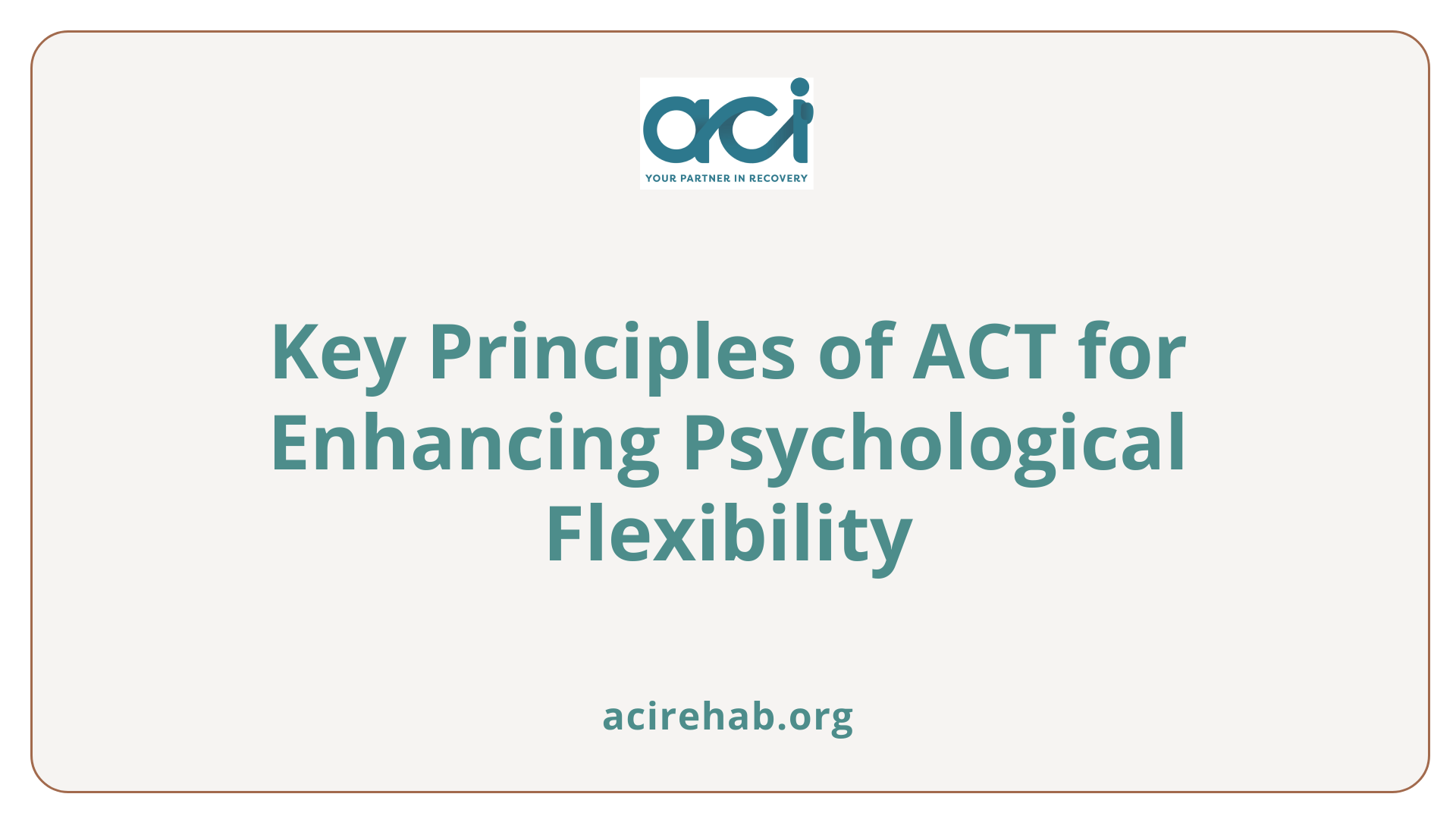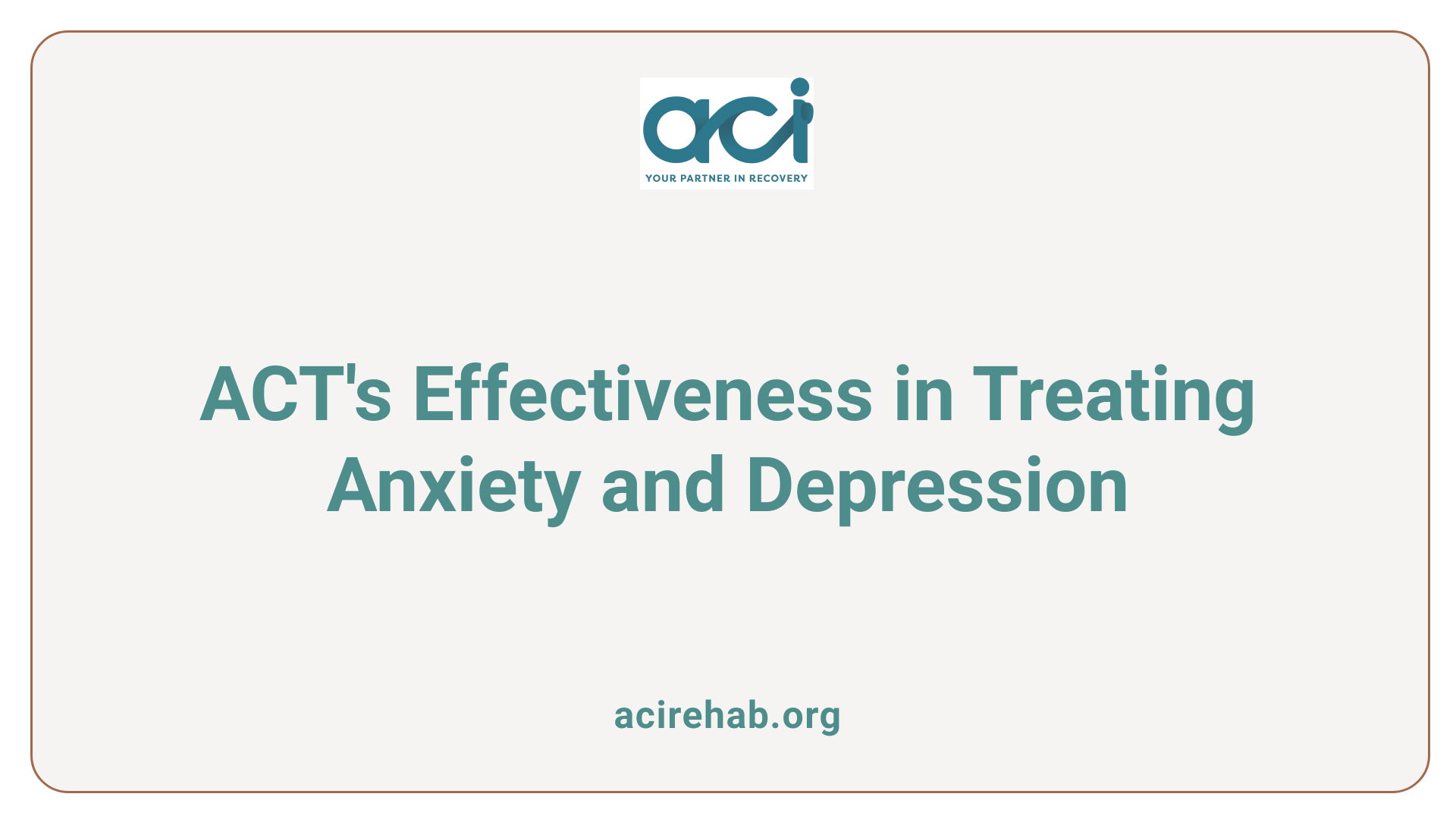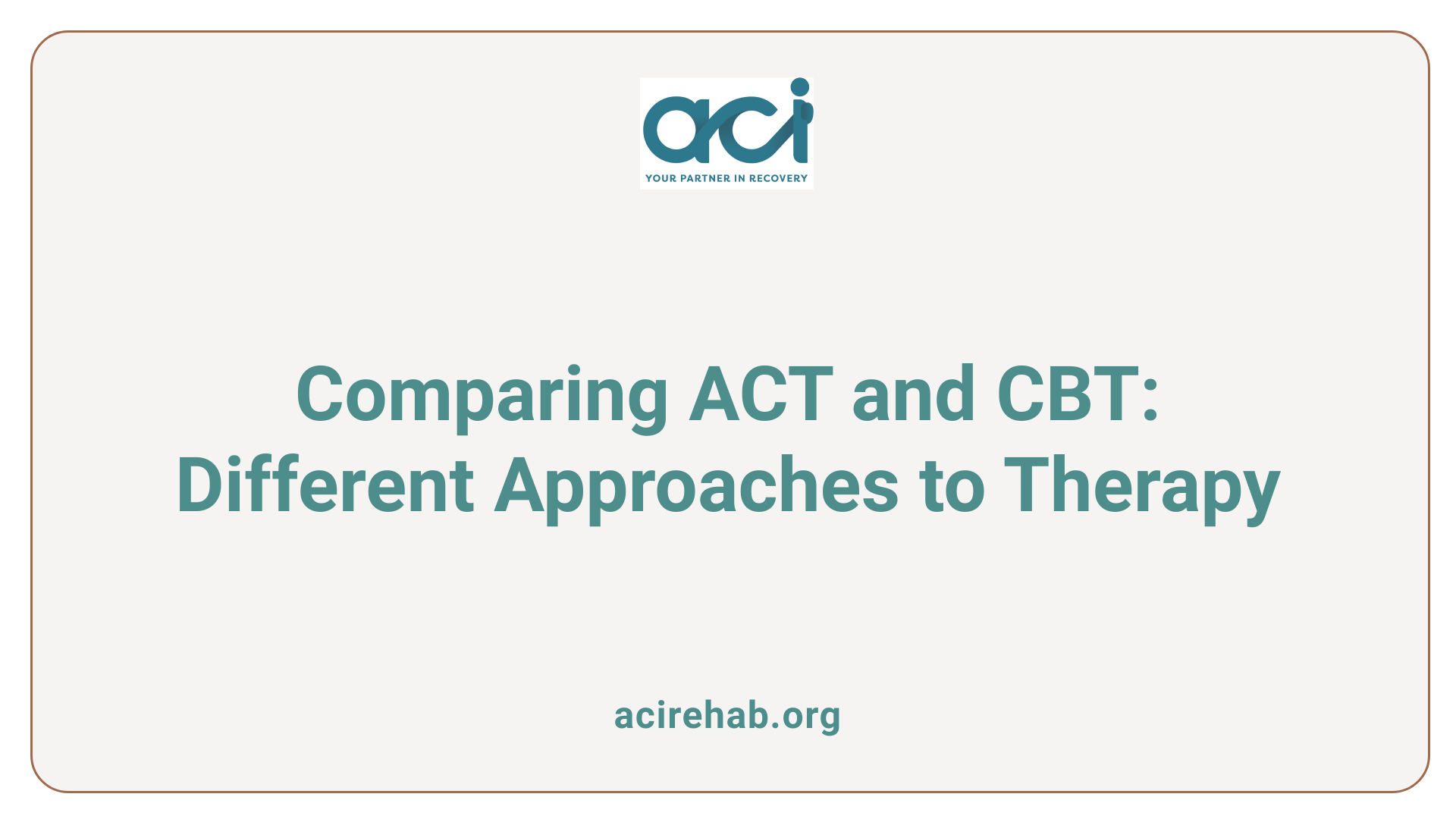Unpacking the Therapeutic Impact of ACT
Acceptance and Commitment Therapy (ACT) is gaining recognition as an effective approach to mental health treatment. It empowers individuals to live meaningful lives in alignment with their values despite the challenges they face. This article explores the principles of ACT, its techniques, and its benefits across various mental health conditions.
Understanding Acceptance and Commitment Therapy (ACT)

What is Acceptance and Commitment Therapy (ACT)?
Acceptance and Commitment Therapy (ACT) is a form of psychotherapy developed by Steven C. Hayes in the 1980s. It integrates acceptance and mindfulness strategies with commitment and behavior-change techniques, designed to enhance psychological flexibility. The therapy is constructed around six core principles:
- Cognitive Defusion: Learning to separate thoughts from feelings.
- Expansion/Acceptance: Embracing difficult emotions without judgment.
- Contact with the Present Moment: Focusing on the now rather than past or future worries.
- The Observing Self: Gaining perspective on one’s thoughts and emotions.
- Values Clarification: Identifying personal values to guide decisions and actions.
- Committed Action: Taking steps toward meaningful goals aligned with those values.
ACT emphasizes accepting difficult thoughts and feelings instead of avoiding or suppressing them. This approach fosters a deep connection to one’s core values, guiding meaningful action in everyday life.
How does ACT work?
By encouraging self-awareness and resilience, ACT helps individuals navigate the complexities of anxiety, depression, and trauma. It empowers them to live fulfilling lives by aligning their behaviors with personal values, ultimately helping to enhance their capacity to respond effectively to challenging emotions.
Why is ACT significant?
ACT’s focus on psychological flexibility is vital in various therapeutic contexts, as it effectively addresses emotional difficulties by fostering acceptance. This versatility makes ACT a valuable option for individuals dealing with a myriad of mental health challenges.
Principles of ACT: Building Blocks of Psychological Flexibility

What are the core principles of ACT and how do they improve psychological flexibility?
The core principles of Acceptance and Commitment Therapy (ACT) include:
- Acceptance: Embracing uncomfortable thoughts and feelings without trying to change them fosters emotional resilience.
- Cognitive Defusion: This involves learning to detach from one’s thoughts, enabling individuals to view them as separate from themselves, significantly reducing their negative impact.
- Being Present: Focusing on the current moment enhances awareness, enabling more flexible and adaptive behaviors.
- Self as Context: Encouraging individuals to see themselves beyond their thoughts and experiences promotes a healthier self-concept.
- Values: Identifying personal values guides individuals to make choices that align with what truly matters to them, enhancing motivation.
- Committed Action: Taking meaningful steps toward valued goals reinforces engagement in life despite challenges.
These principles work synergistically to improve psychological flexibility, which is crucial for effectively navigating life’s challenges. By learning to accept difficult emotions and thoughts, individuals can respond to situations more flexibly, thus fostering a greater sense of purpose and satisfaction in their lives.
Mindfulness in ACT
Mindfulness is a central component within ACT, promoting a nonjudgmental awareness of thoughts and feelings. By practicing mindfulness, individuals become more attuned to their internal experiences, which aids in recognizing patterns of avoidance and the influence of unhelpful thoughts. This awareness enables better emotional regulation and reduces the impact of distressing feelings, allowing individuals to engage more fully with life.
| Core Principle | Description | Impact on Flexibility |
|---|---|---|
| Acceptance | Embrace uncomfortable thoughts and feelings | Fosters emotional resilience |
| Cognitive Defusion | Detach thoughts from self | Reduces the negative impact of thoughts |
| Being Present | Focus on the current moment | Enhances awareness and behavior flexibility |
| Self as Context | View oneself beyond thoughts | Promotes a healthier self-concept |
| Values | Clarify personal values | Guides meaningful actions aligned with those values |
| Committed Action | Act on identified values | Reinforces engagement in life despite challenges |
By integrating these core principles, ACT helps individuals build a different relationship with their internal experiences, ultimately leading to improved mental health and well-being.
Addressing Anxiety and Depression with ACT

How effective is ACT in treating anxiety and depression?
Acceptance and Commitment Therapy (ACT) has demonstrated substantial effectiveness in treating both anxiety and depression. This therapy fosters psychological flexibility and promotes the acceptance of negative emotions, allowing individuals to engage with their feelings without judgment. Systematic reviews of randomized controlled trials indicate that ACT is more effective than waitlist controls and treatment-as-usual, while showing comparable outcomes to Cognitive Behavioral Therapy (CBT).
ACT employs mindfulness and cognitive defusion techniques, enabling individuals to distance themselves from distressing thoughts and symptoms. This approach allows them to focus on engaging in meaningful activities that align with their personal values. Research confirms that ACT not only reduces symptoms but also helps individuals maintain treatment gains over time, presenting a viable long-term treatment option.
Additionally, ACT has been particularly beneficial for diverse populations, including veterans, who have reported significant improvements in their quality of life and reductions in depressive symptoms.
What coping strategies does ACT offer for managing anxiety and depression?
ACT introduces various coping strategies designed to enhance psychological flexibility and facilitate emotional resilience. Some core strategies include:
- Acceptance: Encouraging individuals to accept their thoughts and feelings instead of avoiding them.
- Cognitive Defusion: Teaching techniques to alter the relationship with thoughts, preventing them from dictating behaviors.
- Mindfulness: Focusing on the present moment to avoid being overwhelmed by past or future worries.
- Values Clarification: Helping individuals identify and commit to actions that resonate with their core values, thus enhancing motivation and commitment.
By employing these strategies, ACT fosters a supportive environment where individuals can effectively manage their emotions and cultivate a fulfilling life despite the presence of anxiety and depression.
Techniques in ACT: Tools for Transformation

What are some techniques or exercises used in ACT?
Acceptance and Commitment Therapy (ACT) employs a variety of techniques aimed at fostering psychological flexibility. This approach encourages individuals to adopt a healthier relationship with their thoughts and feelings through several key processes:
- Acceptance: This involves acknowledging and embracing difficult emotions rather than avoiding them. Patients learn to accept their feelings without judgment, which can lessen psychological distress.
- Cognitive Defusion: Techniques in this area encourage individuals to distance themselves from negative thoughts and view them as just mental events, thereby reducing their power. Exercises such as the ‘Leaves on a Stream’ metaphor help visualize thoughts drifting away, promoting a clearer perspective.
- Mindfulness Practices: Mindfulness exercises in ACT, such as breathing awareness and sensory awareness, assist individuals in focusing on the present moment. These practices enhance acceptance of experiences and facilitate a nonjudgmental view of thoughts and feelings.
- Values Clarification: This technique helps identify personal values, guiding individuals to set meaningful goals that align with their core beliefs. Worksheets like the ‘Willingness and Action Plan’ aid in operationalizing these values into concrete actions.
- Committed Action: This involves taking actionable steps towards achieving goals aligned with one’s values despite the presence of challenging emotions. Exercises that involve enhanced self-awareness and commitment to values promote resilience and focus towards personal growth.
Using these techniques not only helps clients manage their emotions and thoughts but also empowers them to live lives imbued with purpose and fulfillment.
ACT’s Impact on Chronic Pain Management
Can ACT be beneficial for managing chronic pain?
Yes, Acceptance and Commitment Therapy (ACT) can be beneficial for managing chronic pain. Unlike traditional approaches that often focus on pain elimination, ACT encourages individuals to shift their attention towards living effectively alongside their pain. This therapy emphasizes acceptance strategies that help individuals lessen the control pain has over their lives, fostering a more positive and proactive outlook.
ACT employs techniques such as experiential exercises and values-based goal setting. By clarifying personal values, individuals can engage in meaningful activities, even in the presence of chronic pain. This approach not only promotes psychological flexibility but also supports emotional resilience, allowing individuals to adapt their thoughts and behaviors in ways that enhance their quality of life.
Long-term benefits
Research shows that ACT can lead to significant improvements in overall functioning for those managing chronic pain. Notably, patients report enhanced pain acceptance and reductions in anxiety and depression, with many of these positive effects persisting well beyond the duration of treatment. By focusing on what truly matters—aligning actions with values—ACT helps individuals cultivate a rich life filled with purpose, even amidst ongoing pain challenges.
In summary, ACT empowers those with chronic pain to foster a greater sense of control over their lives, highlighting the importance of living fully rather than merely striving for pain relief.
ACT vs Clinical Staple: Cognitive Behavioral Therapy (CBT)

How does ACT compare to Cognitive Behavioral Therapy (CBT)?
Acceptance and Commitment Therapy (ACT) and Cognitive Behavioral Therapy (CBT) share the common goal of enhancing mental health but approach this aim differently. CBT primarily focuses on identifying and reshaping negative thought patterns to provide symptom relief. It’s particularly effective for conditions such as anxiety and depression, making it a staple in psychological treatment.
Conversely, ACT encourages individuals to accept their thoughts and feelings, allowing them to experience their emotions without judgment. This acceptance is coupled with a commitment to pursue actions aligned with personal values, fostering greater psychological flexibility. Rather than primarily aiming for symptom reduction, ACT promotes living a meaningful life, even amidst challenging feelings.
Comparative effectiveness
Both therapies have demonstrated effectiveness in clinical settings. Research shows that while CBT is often more direct and shorter-term, targeting the immediate symptoms, ACT can lead to more profound psychological changes by nurturing resilience in the face of emotional difficulties. They are both underpinned by evidence-based practices, ultimately providing patients with the tools they need to navigate their unique mental health journeys.
| Aspect | ACT | CBT |
|---|---|---|
| Focus | Acceptance of emotions and value-based living | Changing negative thought patterns |
| Treatment Length | Often longer-term, integrated into daily life | Typically shorter and more structured |
| Effectiveness | Works well for chronic conditions and promotes psychological flexibility | Effective for acute symptoms |
| Core Approach | Mindfulness and emotional acceptance | Cognitive restructuring |
In summary, ACT and CBT each offer valuable perspectives in therapy, catering to different needs and experiences in promoting mental well-being.
Barriers and Considerations in Practicing ACT
Limitations of ACT
While Acceptance and Commitment Therapy (ACT) has proven beneficial for many, it’s not without its limitations. One major challenge is that clients may struggle to fully engage in its core mindfulness and acceptance practices. These skills require active participation, and some individuals may find it hard to adopt this approach, especially when facing intense emotions.
Moreover, clients with deeply rooted traumas may find ACT unsatisfactory. The therapy tends to focus on present actions rather than delving into past traumas, which can leave some issues unaddressed. Additionally, for individuals dealing with psychosis or significant cognitive impairments, the abstract concepts inherent in ACT can be difficult to grasp, hindering effective application of the therapy’s principles.
Challenges for Clients and Therapists
Another considerable hurdle is that there’s no standardized qualification for ACT therapists. This can make it challenging for individuals to find a qualified practitioner, potentially leading to inconsistent levels of care. The financial aspect can also be a barrier; therapy costs vary, and not everyone has access to resources that cover mental health treatment.
In conclusion, despite its many benefits, ACT poses certain disadvantages and challenges that clients and therapists should acknowledge and navigate thoughtfully.
The Role of Psychological Flexibility in Mental Health
Benefits of psychological flexibility
Psychological flexibility is a crucial concept in Acceptance and Commitment Therapy (ACT). It allows individuals to adapt their thoughts and behaviors so they align with their core values, even in the face of difficult emotions. This shift in thinking fosters resilience, enabling better coping strategies and emotional regulation. Individuals who develop psychological flexibility often experience reduced symptoms of anxiety and depression, leading to an enhanced quality of life.
Application in daily life
In daily life, psychological flexibility manifests when individuals can accept negative thoughts and feelings without judgment. For instance, someone facing social anxiety may learn to engage in conversations despite feeling anxious, prioritizing their value of connection over the discomfort of fear. By cultivating this flexibility, individuals can make choices that lead to meaningful experiences, supporting overall mental wellbeing and personal growth.
ACT in Diverse Treatment Settings
Adoption in Various Environments
Acceptance and Commitment Therapy (ACT) has gained recognition for its adaptability across numerous therapeutic settings. From mental health clinics to primary care facilities and even online interventions, ACT provides a versatile approach suitable for diverse patient needs. Research has demonstrated its effectiveness in individual therapy, group settings, and digital formats, allowing more individuals to access this valuable treatment option.
Integration with Other Therapies
Moreover, ACT is often integrated with other evidence-based therapies, enhancing its impact. For instance, in addiction treatment programs, ACT complements traditional methods by helping patients align their recovery goals with personal values. Such an integrative approach is particularly beneficial for individuals with comorbid mental health and substance use disorders, fostering better adherence to treatment plans. This capacity for integration further strengthens ACT’s role in a holistic therapeutic framework, promoting overall psychological well-being.
The Growing Relevance of ACT in Mental Health
Acceptance and Commitment Therapy (ACT) continues to gain traction as a versatile and effective therapeutic option for various mental health issues. By promoting psychological flexibility and encouraging value-driven living, ACT offers individuals the tools to lead fulfilling lives despite their challenges. Its principles, such as mindfulness and acceptance, enable clients to cultivate emotional resilience, making it a valuable part of mental health treatment strategies.
References
- What are the Benefits of Acceptance and Commitment Therapy (ACT)?
- 5 Benefits of Acceptance & Commitment Therapy | Mental Health
- Acceptance and Commitment Therapy: Benefits and How to Try It
- Acceptance and Commitment Therapy: A Transdiagnostic …
- Uses & Benefits of Acceptance and Commitment Therapy
- What is ACT therapy? Overview, uses, and benefits
- Acceptance and Commitment Therapy (ACT) – Verywell Mind
- The Powerful Benefits Of ACT For Mental Health

